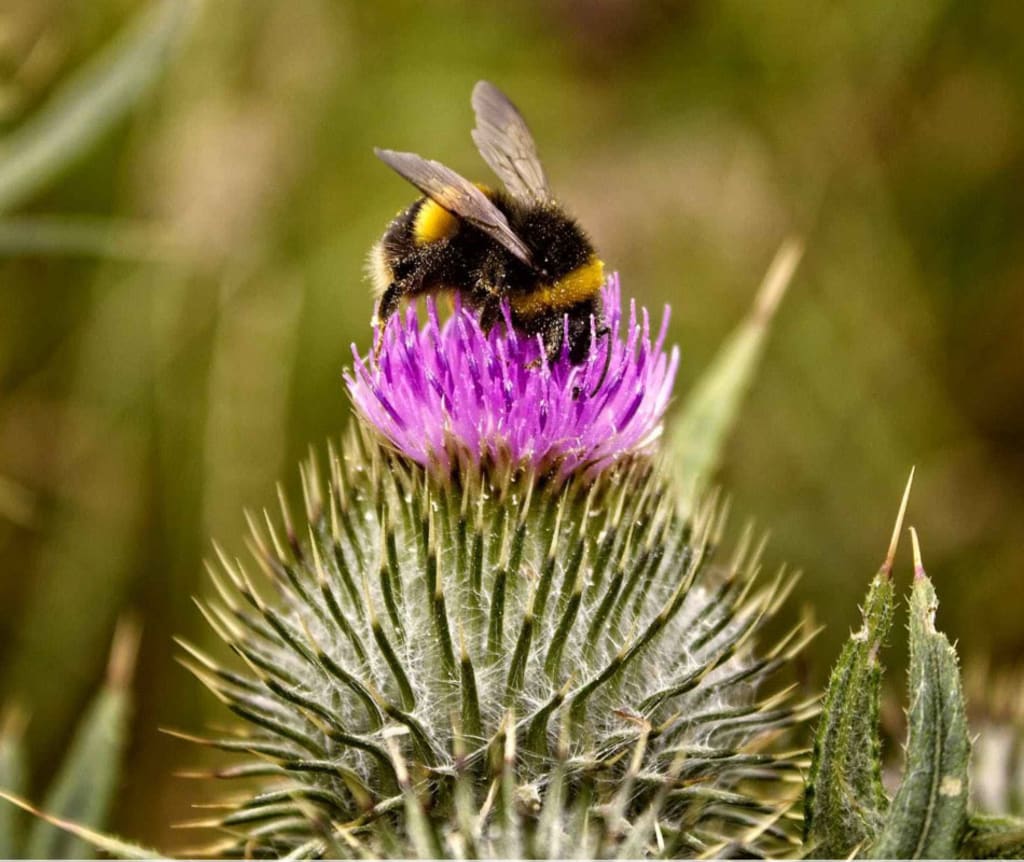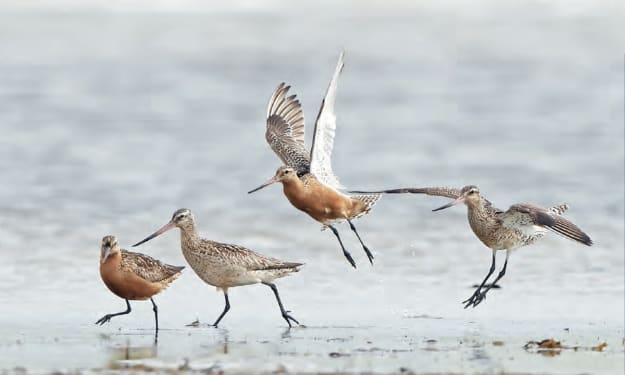BUMBLEBEE HIVES CAN PROGRESS THROUGH SHARED LEARNING
Bumblebee hives provide fascinating insights into animal behaviour in groups. Find out how a new study suggests that bees can learn complex, multi-step tasks through social interaction.

I can still remember being fascinated by bumblebees as a small child. They would buzz around, pollinating the lilac bushes beside the house where I grew up.
In my youth, I encountered lots of bees, either on camping trips or working in construction during summer breaks from school. Oddly enough, despite all that contact, I’ve never been stung by a bee.
Of course, one of the fascinating things about bees is their social interaction. Bumblebee hives, or colonies, involve each bee playing a specialized role in building and maintaining the hive, gathering and storing food, raising the young, and protecting the queen bee.
DR. ALICE BRIDGES STUDIED HOW BEES LEARN FROM ONE ANOTHER
Dr. Alice Bridges earned her doctorate in psychology at Queen Mary University of London’s Bee Sensory and Behavioural Ecology Lab. She studied how bumblebee hives learn from one another and build on their shared knowledge over time.
The journal Nature published a study this week on which Dr. Bridges was a lead author. The study found that bumblebee hives can learn complex, multi-step tasks through social interaction, even though no individual bee can solve them on their own.
They came up with an experiment to answer two key questions. Can humans train bees to do complex tasks, and if so, can trained bees pass that knowledge on to other bees?
TWO-STEP PUZZLE BOX
The researchers built a two-step puzzle box. Then, they trained a group of bees to solve the puzzle by providing a sweet reward at each of the two steps.
Then, the scientists took away the first treat. Now the bees had to remember how to solve both puzzles and open the whole box to earn their reward.
“This is an extremely difficult task for bees,” Dr. Bridges explained. “They had to learn two steps to get the reward, with the first behaviour in the sequence being unrewarded.”
“DEMONSTRATOR BEES” ENABLED OTHERS TO LEARN COMPLEX TASKS
The bees had a difficult time learning these two complex tasks from scratch. Once they had mastered both tasks, the team used them as “demonstrator bees” for a new group from the bumblebee hive that had never seen the puzzle box before.
Those bees that had the chance to watch one of the demonstrators bees quickly picked up the tasks needed to solve the puzzle box, even though the “new-bees” (pun intended!) only received one reward instead of two.
“We initially needed to train demonstrator bees with a temporary reward included there, highlighting the complexity,” Dr. Bridges explained. “Yet, other bees learned the whole sequence from social observation of these trained bees, even without ever experiencing the first step’s reward.”
CUMULATIVE CULTURE NOT UNIQUE TO HUMANS
Traditionally, we humans have been telling ourselves that we’re the only creatures capable of advanced social learning, or what scientists call “cumulative culture.” This new research suggests that even insect communities like bumblebee hives have the basic traits they need to collectively build on their group’s shared knowledge.
Human culture is both complex and expansive. Scientists have always assumed that our multifaceted, dynamic culture arose from our remarkable and mysterious cognitive abilities.
The study also included a control group of other bumblebee hive members who had never seen the puzzle box. “When we let other bees attempt to open the box without a trained bee to demonstrate the solution, they didn’t manage to open any at all,” Dr. Bridges explained, suggesting that social observation was the key to solving the puzzle.
MANY ANIMALS PERFORM COMPLEX TASKS
Animal behaviour has been hard for scientists to explain. Many animals perform complex tasks that seem impossible for them to learn independently or instinctively.
This new research suggests that even simpler organisms like bees can learn from one another and transmit knowledge from one generation to the next. It seems as if cumulative culture isn’t unique to humans after all.
People tend to view evolution as a struggle for survival between rugged individuals. That was never really what Charles Darwin meant by “survival of the fittest.”
SURVIVAL OF THE FITTEST REQUIRES ADAPTABILITY
The fittest are those who can best adapt to change. Also, evolution is about the survival of the species rather than any specific individual.
So, being able to cooperate and share new ideas is much more important to a species’s survival than physical strength or individual intelligence. So, cumulative culture appears to be one of the main drivers of natural selection.
AND ANOTHER THING…
Understanding this cooperative, as opposed to competitive, aspect of evolution is part of the new story humanity is seeking to make sense of the natural world and our place within it. We’re coming to realize that ecosystems function more on synergy and collaboration than on some sort of struggle for dominance.
Professor Lars Chittka was Dr. Bridges’s academic supervisor and the study’s other lead author. He concluded by saying, “This challenges the traditional view that only humans can socially learn complex behaviour beyond individual learning. It raises the fascinating possibility that many of the most remarkable accomplishments of the social insects, like the nesting architectures of bees and wasps or the agricultural habits of aphid- and fungus-farming ants, may have initially spread by copying of clever innovators, before they eventually became part of the species-specific behaviour repertoires.”
We always have more to learn if we dare to know.
LEARN MORE:
Bees master complex tasks through social interaction
Bumblebees socially learn behaviour too complex to innovate alone
Western Bumblebee Populations Collapsing: Short on Data
Bee Pollination, Habitats and Human Meddling
Evolution: Is It Always Genetic?
About the Creator
David Morton Rintoul
I'm a freelance writer and commercial blogger, offering stories for those who find meaning in stories about our Universe, Nature and Humanity. We always have more to learn if we Dare to Know.






Comments (1)
Fascinating and informative! I love bees!